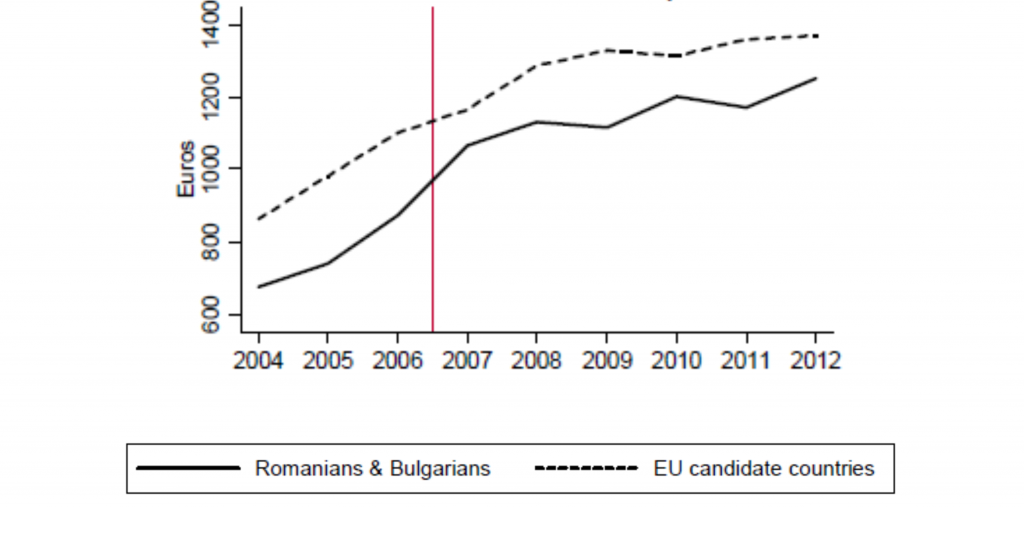Legal status, work Permits, and the consumption response of immigrant households
21 July 2020
In our latest post, Dr Ezgi Kaya and Dr Effrosyni Adamopoulou focus on the 2007 European Union (EU) enlargement to show how legal status for undocumented immigrants as well as simplifying the bureaucratic procedure and extending the duration of work permits for documented immigrants have implications for domestic demand.
The COVID-19 pandemic is reviving the immigration debate as more and more countries are adopting some form of legalisation for their undocumented immigrant population.
Several advocates (see the European Commission, UK Government and Parliament Petitions and Social Europe) have expressed concerns related to health and social issues that involve undocumented immigration. Moreover, in many countries, a large share of immigrants is employed in so-called “essential” occupations. Italy’s agriculture sector, for instance, which relies on seasonal farmworkers from countries such as Romania and Bulgaria, has been facing a critical labour shortage due to the lockdown restrictions.
To address these concerns, Portugal has enacted measures already in March, granting temporary residence permits to immigrants and asylum seekers, whose applications were pending. In mid-May, after a month of negotiations, Italy announced the legalisation of undocumented immigrant workers in the agriculture and domestic-work sectors as well as the issuance of temporary residence permits for immigrant job seekers with expired permits, who were previously employed in those sectors.
In a recent study, we show that gaining legal status for undocumented immigrants as well as simplifying the bureaucratic procedure and extending the duration of work permits for documented immigrants may have an important impact on domestic demand.1
In particular, we focus on the 2007 EU enlargement and study whether and through which channels the extension of EU citizenship affected the consumption behaviour of immigrant households from new member states (Romania and Bulgaria).
Figure 1 shows the average monthly consumption expenditure of immigrant households from Romania and Bulgaria and from candidate member countries2 that were already residing in Italy before the 2007 EU enlargement.
Romanians and Bulgarians living in Italy had lower average monthly consumption than immigrants from EU candidate countries. The difference remained fairly constant until 2007, suggesting that the consumption expenditure of Romanians and Bulgarians and immigrants from other candidate countries were following parallel trends prior to the EU enlargement.
From 2006 to 2007, with the EU accession, the consumption of the immigrants from new member states increased substantially, while the consumption of the immigrants from candidate countries continued to grow at approximately the same rate as in the previous years.
Figure 1: Average monthly consumption expenditure of immigrant households residing in Italy, 2004-2012

Source: Authors’ elaborations on ISMU data.
Why an increase in consumption?
Uncertainty about future legal status can depress the economic activity of immigrants, by inducing them to postpone consumption decisions until the uncertainty is sufficiently resolved.3
With the 2007 enlargement, Romanian and Bulgarian immigrants were instantly granted with EU citizenship.
For undocumented immigrants who were already residing in member states, this implied automatic legalisation, thereby resolving uncertainty about their legal status.
For documented immigrants from new member states residing in Italy, the EU accession also implied a resolution of uncertainty in the labour market regarding the renewal of their work permits, as Italy was the only major economy in Europe to lift temporal labour market restrictions for Romanians and Bulgarians.4
Our unique dataset5 allows us to shed light on the exact mechanisms behind the increase in consumption of Romanians and Bulgarians following the 2007 enlargement.
We find that previously undocumented immigrants experienced an increase in the labour income by moving from informal to formal sector. As a result, they increased their expenditure on food, clothes, and other basic-need items.6
Documented immigrants also increased their consumption expenditure, but mostly on durable goods.7
In this case, the rise in consumption is a result of enhanced labour market stability, through an increased probability of getting a permanent contract following the EU accession. This decreases the uncertainty regarding future labour income and it consequently increases household consumption spending on account of a less pressing need to save for a rainy day.
Conclusions
While legalisation policies are usually difficult to implement due to the high political cost entailed, our findings suggest that simplifying the bureaucratic procedure and extending the duration of work permits for documented immigrants may lead to similar consumption increases.
These results have important policy implications in a period of increased legal uncertainty, following the withdrawal of the UK from the EU. The bureaucratic burden is expected to significantly increase for more than 3.5 million EU immigrants residing in the UK, who unless they hold British citizenship will need to acquire some kind of permit (settled or pre-settled status).
Moreover, a positive effect of the EU enlargement on the consumption of immigrant households contributes to the recent debate over the possible accession of Albania and North Macedonia to the EU, as well as over the effectiveness of the recent legalisation programmes that various countries have adopted amid the COVID-19 pandemic.
Dr Ezgi Kaya is a Lecturer in Economics at Cardiff Business School.
Dr Effrosyni Adamopoulou is a postdoctoral researcher at the University of Mannheim and an external lecturer at the European Business School.
Endnotes
1 See Adamopoulou and Kaya (2020) for details.
2 Albania, Bosnia and Herzegovina, Croatia, Kosovo, North Macedonia, Montenegro, Serbia, and Turkey.
3 The uncertainty triggered by the new pandemic is having also a direct negative effect on consumption due to social distancing and lockdown restrictions. See Baker et al. (2020) for a discussion of the short-term responses of household consumption to the coronavirus pandemic.
4 Bulgaria and Romania joined the EU on January 1, 2007. However, the accession treaties allowed member states to impose temporal labour market restrictions on Bulgarian and Romanian workers for up to seven years after accession. The majority of member states, including Italy, announced that they would impose interim restrictions to protect their labour markets from a large flow of immigrants from the new member states and therefore Romanian and Bulgarian immigrants would still be required to have a permit in order to work. However, just three days prior to the EU accession, on December 28, 2006, Italy lifted these restrictions.
5 Institute for Multi-ethnic Studies (ISMU) 2004-2012 surveys.
6 A previous study by Dustmann et al. (2017) finds that amnesties boost immigrants’ consumption. Mastrobuoni and Pinotti (2015) show a decrease in immigrant crime following the 2007 EU enlargement.
7 Some examples of durable goods are appliances, home and office furnishings, lawn and garden equipment, consumer electronics, toys, small tools, sporting goods, photographic equipment, jewellery, motor vehicles and motor vehicle parts, turbines, and semiconductors.
References
- Adamopoulou, E, and E Kaya (2020), “Not just a work permit: EU citizenship and the consumption behavior of documented and undocumented immigrants”, Canadian Journal of Economics, forthcoming.
- Baker, S, R A Farrokhnia, S Meyer, M Pagel and C Yannelis (2020), “How does household spending respond to an epidemic? Consumption during the 2020 Covid-19 Pandemic”, COVID Economics: Vetted and Real-Time Papers, Issue 18, 73-108, May 2020.
- Dustmann, C, F Fasani and B Speciale (2017), “Illegal migration and consumption behavior of immigrant households”, Journal of the European Economic Association, 15(3), 654-691.
- Mastrobuoni, G and P Pinotti (2015), “Legal status and the criminal activity of immigrants”, American Economic Journal: Applied Economics, 7(2), 175-206.
- March 2024
- April 2023
- August 2022
- July 2022
- April 2022
- March 2022
- February 2022
- December 2021
- October 2021
- September 2021
- May 2021
- April 2021
- March 2021
- February 2021
- January 2021
- December 2020
- November 2020
- October 2020
- September 2020
- August 2020
- July 2020
- June 2020
- May 2020
- April 2020
- March 2020
- February 2020
- January 2020
- November 2019
- October 2019
- September 2019
- August 2019
- July 2019
- June 2019
- May 2019
- April 2019
- March 2019
- February 2019
- January 2019
- December 2018
- November 2018
- October 2018
- September 2018